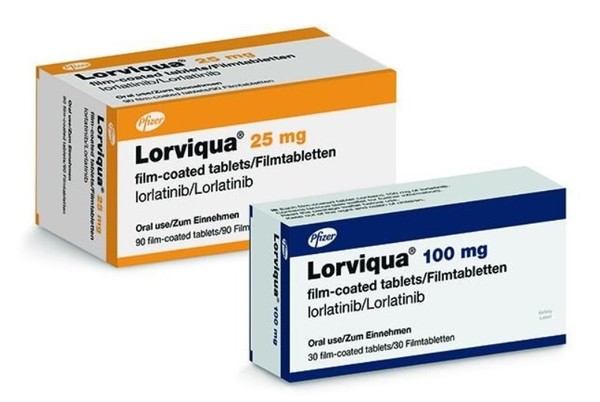Pfizer’s Lorviqua (ingredient: lorlatinib), the only third-generation anaplastic lymphoma kinase (ALK) tyrosine kinase inhibitor (TKI) usable for patients who failed the second-generation ALK TKI, obtained expanded indication as the first-line therapy to treat ALK-positive metastatic non-small cell lung cancer (NSCLC).
The Ministry of Food and Drug Safety authorized the use of Lorviqua for patients with ALK-positive metastatic NSCLC on May 1, less than one year after the treatment obtained marketing approval.

On July 29 last year, the regulator approved Lorviqua as monotherapy for adult patients with ALK-positive advanced NSCLC who received alectinib or ceritinib as the first-line ALK TKI treatment or those who received crizotinib and at least one other ALK TKI.
On April 7, Lorviqua passed the Health Insurance Review and Assessment Service’s (HIRA) review for health insurance coverage. Pfizer is negotiating with the National Health Insurance Service (NHIS) to set the drug price.
Lorviqua received conditional approval as the second-line treatment for ALK-positive NSCLC based on a phase 2 study. Then, the treatment obtained the full license based on the findings of a phase 3 CROWN trial, which compared Lorviqua with the first-generation drug crizotinib as the first-line therapy in 296 patients with ALK-positive NSCLC.
The study results showed that 78 percent of Lorviqua-treated patients maintained progression-free survival at 12 months, versus 39 percent of the crizotinib group. Lorviqua lowered the risk of disease progression and death by 72 percent.
The Lorviqua group’s objective response rate was 76 percent, an improvement compared to 58 percent of the crizotinib group. Lorviqua’s efficacy was more pronounced in patients with brain metastasis. Among those with brain metastasis, the intracranial response rate was 82 percent in the Lorviqua group and 23 percent in the crizotinib group.
Seventy-one percent of patients with brain metastases treated with Lorviqua showed a complete intracranial response.
Lorviqua showed fewer reports of diarrhea and vomiting in safety profiles that commonly occur in crizotinib-treated patients. However, Lorviqua-treated patients showed increased lipids or more neurocognitive adverse reactions.
Although the third-generation targeted therapy Lorviqua is on a par with existing first- and second-generation ALK TKIs as the first-line therapy, Lorviqua is likely to be used as the second-line therapy Lorviqua is non-reimbursable. There is no later-stage treatment option if a patient shows resistance to Lorviqua.

